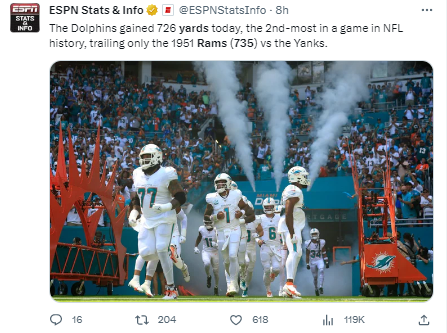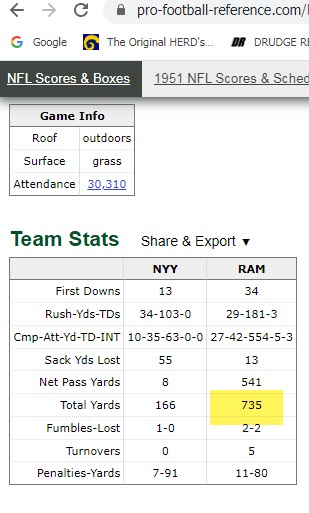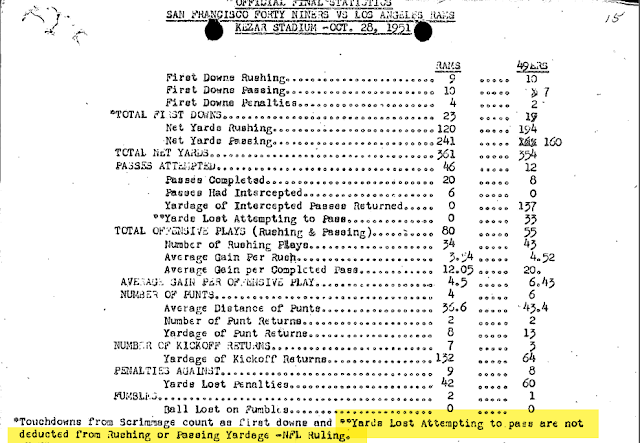By John Turney
What is known for sure is that today the Miami Dolphins rushed for 350 yards and passed for 376 yards for a total of 726 yards. Here is stats from today's gam, a 70-20 demolition of the Denver Broncos—
What is not known is if that should be the NFL record or not. Officially it is not. But is that the right call?
The issue is that there are two credible totals for the 1951 Los Angeles Rams in a 9/28/1951 game against the New York Yanks.
One is from The Official NFL Record & Fact Book and the other on Pro Football Reference. The Record and Fact Book shows the Rams gained 735 yards that day and Pro Football Reference shows a net yardage total of 722 yards of offense.
Both have been used on social media and purported to be accurate. Can they both be accurate? The short answer may surprise you. The answer is "yes".
Here are a couple of examples of Tweets (X posts)—
Here is one showing that 726 is a new record—
Here is the entry from the Record & Fact Book—
And here is Mike Klis who covers the Broncos for NBC 9 NEWS in Denver recognizing the problem—
So, what do the two sources say?
Here is the entry from the Record & Fact Book—
And this is a screenshot from Stathead, the search engine for Pro Football Reference's data. It shows 722 yards gained by the Rams on that day.
This is the boxscore from Pro Football Reference that shows 735 total yards but that is without the 13 yards attempting to pass deducted. So, the net is 722.
So, from this, you can see the Rams had 195 yards of rushing gains and 14 yards of losses for a net of 181 yards rushing.
Norm Van Brocklin passed for 554 yards individually on his 27 completions but he was throw for a 13-yard loss. It is that loss attempting to pass (later called sacks) that is the discrepancy.
If you deduct that from the team passing total it leaves a net of 541. That plus the net rushing is 722 yards.
But they were not deducted.
The column that reads "TOTAL NET YARDS GAINED-RUSHING & PASSING" showed 735 and that is still the official total. The gamebook is the source and that is what Elias Sports Bureau and ESPN Stats & Information use to verify records.
Here is the play as listed in the Gamebook—
Here is a clip of the play in question—Right defensive end Barney Poole gets around the right edge and takes Van Brocklin down for the loss. The Rams are penalized for illegal motion but that play is declined so it stays in the books.
What does all this lead to?
Both yardage totals are technically right. It's like the old accountant joke of asking an accountant what two plus two is. he replies "What do you want it to be?"
Under the rules at the time yards lost attempting to pass didn't count against the rushing or passing totals. They are just lost in limbo. Gone forever. well, unless the statistics are changed at some point.
And there is a case for doing just that and today's confusion proves that point pretty well. Maybe the older records should be made consistent with how things are scored now.
If official stats people like Elias or others do what Pro Football Reference has already done which is score games as they would be now then the Rams total would be 722, not 735.
Of course, the same would be true for the Yanks in the same game. Their total yards would not be 166 but 111 because they lost 55 yards attempting to pass.
It would be the same for all NFL games from 1950 and 1951 because beginning in 1952 yards lost attempting to pass became a separate category and began to count against a team's total yardage.
Here is a shot of how passing yards were kept from 1952 through today with the note that in 1963 the number of times someone was thrown for a loss was added in, not just the yardage—
Prior to 1950, those types of plays were simply scored as running plays—they didn't count against a team's passing yardage total. If a quarterback was trying to pass but got tackled behind the line of scrimmage it was a rushing loss and counted against the rushing total, so the total yardage at least reflected that.
Here is a shot of a 1949 gamebook summary—
But 1950 and 1951 were different. No telling why, they just were. Here is a shot of a 1951 play-by-play summary with the note that reads "Yards lost attempting to pass are not deducted from Rushing or Passing yardage - NFL Ruling"
So, according to the rules at the time the Rams mark of 735 offensive yards gained is accurate. And if you take that play's yardage away, as would be done now -- or even prior to 1950 as a running play -- the Rams' total offensive yardage output would be 722, not 735. And that would be accurate.
It was simply a quirk in how stats were kept for that two-year period.
So, both are right. The Dolphins set the record. And they didn't.
It depends on how official "official" is.







.jpg)






No comments:
Post a Comment